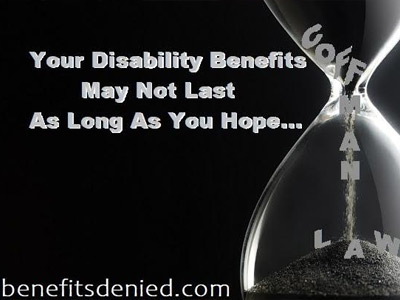Approval of your LTD benefits usually comes with a clause that states “as long as you continue to meet the policy definitions of disability.” But what does that mean?
What are policy definitions of disability?
The policy definitions of disability are exactly what they sound like: what your specific policy defines as being disabled, the medical conditions for which the insurance company will pay, and how long the insurance company will pay for disability caused by those conditions. Most disability insurance policies specify how long they pay for disability from own occupation (generally two years, sometimes shorter) versus disability from any occupation (generally to age 65 or social security retirement age or a stated period) as well.
What is the difference between own occupation and any occupation?
Disability insurance policies separate disability from performing your own occupation from disability from any-occupation. An occupation is different than a job. Think of a target. Your own occupation is like the bulls-eye in the center of the target. Your job is like one point within the circle of the bulls-eye that is your occupation, which contains all the jobs within that occupation. Disability from any occupation adds all of the outer rings to the target – every other job you can reasonably do – all of the other occupations. The insurance company will use a database to look at your job description and compare your abilities, education, salary, and training to determine if they think you would be able to do or be trained for another job during the any-occupation disability period. Adding all of the outer rings generally makes the target easier to hit, and any occupation disability is also generally easier for the disability insurance company to deny than own occupation disability, but not always (it depends on your occupation). If they think you can do another job, they may deny your benefits when your policy transitions from own-occupation disability to any-occupation disability.
Once I get approved for benefits within one of those categories, I should be good, right?
Just because you are approved or initially approved for disability benefits, regardless of which category you fall in to, doesn’t mean the insurance company will continue to pay through that term. Insurance companies can continue to review your claim and change their minds in the future. If your medical providers opinions change, or more commonly, if the insurers’ medical experts opinions change, an approval can turn into a denial down the road. It’s important to continue medical treatment for your disabling conditions and provide documented medical evidence through visits with your treating physicians.
If I’m receiving disability insurance benefits and send in my medical records, I should be good, right?
So let’s say you have been approved for benefits. You are continuing to see your treating physicians and they continue to support your inability to work. Does this mean that you will continue receiving benefits? Unfortunately, that may still not mean you will never have your benefits cut off. Case managers, sometimes called claims specialists, will conduct file reviews on occasion, and sometimes a new case manager takes over the handling of a claim. A case manager may do a file review and conclude you no the policy definitions of disability. A new case manager can be assigned to your claim and not agree with your prior case manager that your are disabled and terminate your benefits. Sometimes the insurer’s doctors disagree with your doctors.
What should I do if my disability insurance is denied?
Check out our BLOG on Long-Term Disability Denials to see what you should do if your disability insurance benefits are denied or terminated. Or contact us to see if we can help with your appeal.



